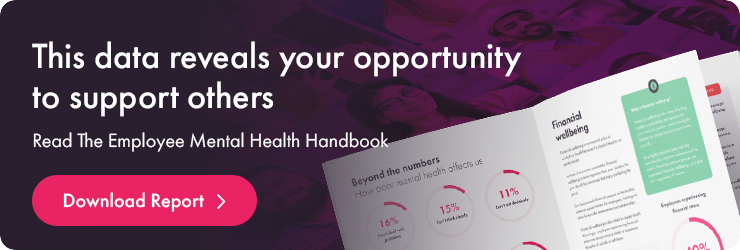The Champion Health team developed The CHAMPIONS Framework because existing advice for supporting your own mental health was clunky and confusing.
In this article, you’ll discover The CHAMPIONS Framework and your nine steps to mental fitness. But first, let’s explore why mental health is so important.
Why is mental health important?
Poor mental health is the single largest contributor to disease in the UK and regularly experienced by 1 in 4 adults.
Worryingly, our own employee wellbeing data found that 76% of employees are experiencing moderate to high levels of stress in general, while 56% are experiencing at least mild symptoms of depression.
Yet, all too often, mental health has been confused (and stigmatised) with common mental health disorders and has subsequently ended up becoming a discussion that few have been willing to engage in.
Good mental health ensures we are content and can thrive. It allows us to feel calm, have self-confidence, deal with change, and cope with daily stresses.
When we face struggles with our mental health (often a result of a significant life event, sudden change or a lack of control) our mood diminishes and energy levels plummet.
We can feel nervous and apprehensive. Some may suffer low self-esteem, experience anxiety and have trouble sleeping. All of which can lead to a heightened risk of engaging in unhealthy behaviours as an unconscious coping mechanism.
The CHAMPIONS Framework
We created The CHAMPIONS Framework to help you achieve a clearer mind and better mental health.
You may not implement all of these strategies at once, but implementing just one will start your journey to better mental wellbeing.
These are your nine steps to nourish your mental fitness and become a mental health champion:
1. Connect
As human beings, we’re social animals. And although we’re the most connected we’ve ever been, meaningful connection has arguably never been more absent.
With loneliness and a lack of purpose being closely linked with mental health issues, it’s important to stay connected to others and keep feelings of isolation at bay.
So, after reading this article, look to reach out to a friend and have a good catch-up. Not only will this benefit your own mental wellbeing, it’ll have a positive impact on them too.
Unsure how to start the conversation? Take a look at these resources:
- How to talk about mental health at work
- The CLASS Approach: How to support others
- How to support a colleague in crisis
2. Hydration
Although focusing on hydration may sound obvious, as a nation we’re chronically dehydrated. Drinking water is often the last thing on our mind, and we much prefer to grab a tea or coffee than a cold glass of H2O.
But staying hydrated is a fundamental health habit, especially as our body is over 60% water.
Only a slight drop in hydration levels can significantly impact energy levels, productivity and concentration, as well as our mental health.
In fact, a study of over 3,000 people found that those who drank more water had a lower risk of anxiety and depression than those that drank less water.
Therefore, one of the simplest yet most effective ways to support your mental wellbeing is to stay on top of your hydration.
One simple tip to improve your hydration habits is to have a water bottle next to you while you’re working. It’s a simple idea, but acts as a reminder to drink water consistently throughout the day.
3. Activity
If exercise was in pill form, every single one of us would take it.
Exercise not only improves our physical health, but our mental health too, with many studies finding that physical activity is highly effective in treating mild-to-moderate depression.
However, as humans, we’re generally becoming less active.
It’s now easier to drive to the shops or take the lift than to move our bodies. But you don’t need to run 5 kilometres every day to be active – you could simply go for a morning run or evening walk.
Try to incorporate these small, bitesize chunks of activity throughout your day to benefit your mental and physical wellbeing, and reap the rewards of one of the most powerful methods of boosting your mental health.
4. Mindful
The term ‘mindful’ simply refers to being in the present moment.
When you’re lying on the beach, doing nothing but listening to the waves crash into the rocks, you’re being mindful.
If you’re paying attention to your breathing before a presentation, that’s being mindful too.
This is eloquently stated in a quote typically attributed to the ancient Chinese Philosopher, Lao Tzu:
“If you are depressed you live in the past,
if you are anxious you live in the future,
if you are mindful, you live in the present.”
And so, by living in the present, it brings you away from those troubling thoughts and helps to calm your mind.
You can practice being mindful in everyday life. For example, when you’re out on a lunchtime stroll, listen to the things you can hear.
Focus on what’s going on around you; what’s happening right here and right now. Even if thoughts pop up, acknowledge them and let them go, always coming back to the present moment.
Another way you can practice this is by focusing on your breath. Not by trying to change or interfere with your breathing, but by simply noticing how your breath is at the moment.
5. Proactive
This refers to proactively looking after your mental health, which is something you’d rarely hear about 10 or 15 years ago.
Why? Because we only spoke about mental health in the context of mental health problems: clinical disorders that needed medical intervention.
Now we’re recognising that, just like physical health, everybody has mental health – all of the time.
It’s therefore essential we take proactive steps to look after our mental wellbeing, even when things are going well.
So, prioritise your downtime and keep doing the things that you enjoy.
Aim to set aside 30 minutes every day to do something just for you, whether that’s going out for a walk, reading a book or listening to your favourite music. Remember, you can’t pour from an empty cup.
6. Impact
Having a positive impact on other people may sound selfless, but research has found that giving to others, or showing acts of kindness, can benefit our own mental health too.
This is because having an impact on others provides a sense of purpose and feelings of reward.
Being kind can come in many different forms, from giving your time volunteering for a charity, to simply holding a door open for someone.
It doesn’t have to be a big gesture to have a significant impact on your mental wellbeing.
7. Open
Thankfully, being open about our mental health is slowly becoming the norm. For many years, stigma has existed around not opening up, and this has stopped many from seeking the support they need.
However, the tide is turning, and we’re all talking about mental health more than ever before.
So, if you’re struggling, reach out to those around you – whether that’s your friends, family members or your GP.
And if you don’t quite feel ready to speak to someone you know, you can also contact charitable helplines such as the Samaritans or Shout.
8. Nutrition
There is more research than ever about the link between our gut and brain.
A study in 2017 found that a Mediterranean diet that’s high in fruit, vegetables, wholegrains, oily fish and unsaturated fats such as olive oil, led to a reduction in depression.
On the flip side, traditionally beige foods – like takeaways and fast food – are linked with poor mental health.
So, next time you sit down to eat, have a look at the colour on your plate.
9. Sleep
The impact that sleep has on our mental wellbeing is no secret, but the extent to which it does is quite remarkable.
Research indicates that among other things, sleep helps to boost your creativity, improve your memory, regulate your emotion and process difficult events.
In fact, Matthew Walker, a world-leading neuroscientist, has also suggested that sleep is so important that it should be prescribed alongside medication to treat certain mental health problems.
But we know it can be difficult to get a good night’s sleep. There are countless factors that can impact our sleep quality and length, some of which are completely outside of our control.
For advice and support on improving the quality of your sleep (and your mental health by extension) take a look at these resources:
Where will you start?
So, there you have it: The CHAMPIONS Framework – nine key steps to supporting your mental wellbeing. Which are you going to implement today?






